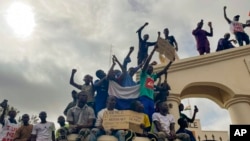As numbers began to swell at a demonstration organized by the junta and civil society groups on Niger's independence day, protesters in Niamey pumped their fists in the air and chanted out support for neighboring countries that have also seen military takeovers in recent years. Some waved Russian flags, and one man brandished a Russian and Nigerien flag sewn together.
Gen. Abdourahamane Tchiani, the former head of Niger's presidential guard who shut President Mohamed Bazoum in his residence and declared himself head of state, vowed not to bow to pressure in a speech on state television on Wednesday night. He called on the population to be ready to defend the nation.
The Economic Community of West African States, whose defense chiefs were meeting in the Nigerian capital of Abuja, has unleashed sanctions and said it could authorize the use of force if soldiers did not restore Bazoum to power by Sunday.
Tiani called the sanctions "inhumane" and said he rejected any foreign interference but was open to dialog within the country.
The coup has been strongly condemned by Western countries, many of which saw Niger as the last reliable partner for the West in efforts to battle jihadis linked to al-Qaida and the Islamic State group in Africa’s Sahel region. Russia and Western countries have been vying for influence in the fight against extremism.
At Thursday's protest, many expressed support for the coup leaders and denounced interference from others.
“For more than 13 years, the Nigerien people have suffered injustices," said protester Moctar Abdou Issa. The junta "will get us out of this, God willing … they will free the Nigerien people.”
“We’re sick of the French,” he added.
France has 1,500 soldiers in Niger who conduct joint operations with its military, and the United States and other European countries have helped train the nation’s troops.
In a closed door meeting Wednesday, dozens of people from civil society organizations, professional groups and trade unions spoke with the coup leaders about their vision for the country. Sanoussi, from M62, was at the meeting and said the junta talked about their priorities for the nation, including securing it from violence.
But another civil society member at the same gathering who did not want to be named for security reasons told the AP they left feeling concerned. They had a strong impression that the French military was going to be ousted soon and that members of civil society groups would help the junta do it.
During the meeting, Tchiani spent a long time speaking about the history of foreign military presence in the region, discussing France's involvement without naming it specifically, and asked those present to help maintain the country's integrity. Tchiani also didn't seem concerned that ECOWAS would intervene or that President Bazoum would resign — which he has yet to do — noting he was no longer in power, the civil society members said.
Even if the junta demands the withdrawal of French troops — as they did in neighboring Mali and Burkina Faso, both of which are run by military leaders — it wouldn't make a difference, said Anne-Claire Legendre, a spokesperson for the French foreign minister during a press briefing on Wednesday.
"We don’t answer to the putschists. We recognize one constitutional order and one legitimacy only, that of President Bazoum,” she said.
Ahead of Thursday's demonstration, the French Embassy in Niamey asked Niger's government to take all measures to ensure the security and protection of its premises after it was attacked by protesters last week and a door was set on fire.
Demonstrators in Niger are openly resentful of France and have been waving Russian flags during protests. Some see Russia and its Wagner mercenary group, which operates in a handful of African countries, including Mali, as a powerful alternative. The new junta leaders have not said whether they intend to ally themselves with Moscow or stick with Niger’s Western partners.
As tensions grow in the capital and the region, many European countries announced the evacuations of their citizens.
By late Wednesday night, nearly 1,000 people had left on four flights and a fifth evacuation was underway, France’s Ministry of Foreign Affairs said.
The U.S. State Department on Wednesday ordered what it said was the temporary departure of nonessential embassy staff and some family members from Niger as a precaution. It said its embassy would remain open. Pentagon press secretary Brig. Gen. Pat Ryder said late Wednesday that the State Department had not requested U.S. military assistance for the departure.
Nigeriens are now bracing for what's ahead. The sanctions announced by ECOWAS included halting energy transactions with Niger, which gets up to 90% of its power from neighboring Nigeria, according to the International Renewable Energy Agency.
Earlier this week, power transmission from Nigeria to Niger was cut off, an official at one of Nigeria’s main electricity companies said, speaking on condition of anonymity because they were not authorized to comment on the issue. The official did not clarify how much of Niger’s power the cut represented, but any reduction would further squeeze citizens in the impoverished country of more than 25 million people.
On Wednesday, the president's party accused the junta of cutting off electricity to his residence since that morning. “As a result, the president of the republic and his family no longer benefit from the rotating supply of energy,” said Kalla Ankourao, the ruling party's general secretary.
Information for this report came from The Associated Press and Reuters.

Forum